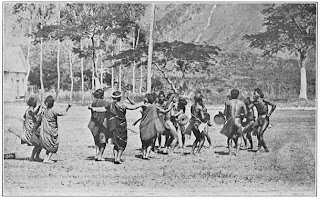 Here’s a short story written by Amador Daguio, a writer who grew up in Lubuagan, Kalinga (he was born in Laoag, Ilocos Norte) before World War II. You can read more about the writer here.
Here’s a short story written by Amador Daguio, a writer who grew up in Lubuagan, Kalinga (he was born in Laoag, Ilocos Norte) before World War II. You can read more about the writer here.
The story is about a young couple who…. well, on second thoughts it’s better if I don’t give any info so as not to destroy your reading experience. It is a good read although it can be quite long (for internet readers anyway), so you might want to get a cup of coffee before you settle down to read.
Wedding Dance
By Amador Daguio
Awiyao reached for the upper horizontal log which served as the edge of the headhigh threshold. Clinging to the log, he lifted himself with one bound that carried him across to the narrow door. He slid back the cover, stepped inside, then pushed the cover back in place. After some moments during which he seemed to wait, he talked to the listening darkness.
“I’m sorry this had to be done. I am really sorry. But neither of us can help it.”
The sound of the gangsas beat through the walls of the dark house like muffled roars of falling waters. The woman who had moved with a start when the sliding door opened had been hearing the gangsas for she did not know how long. There was a sudden rush of fire in her. She gave no sign that she heard Awiyao, but continued to sit unmoving in the darkness.
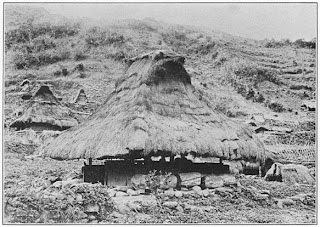 But Awiyao knew that she heard him and his heart pitied her. He crawled on all fours to the middle of the room; he knew exactly where the stove was. With bare fingers he stirred the covered smoldering embers, and blew into the stove. When the coals began to glow, Awiyao put pieces of pine on them, then full round logs as his arms. The room brightened.
But Awiyao knew that she heard him and his heart pitied her. He crawled on all fours to the middle of the room; he knew exactly where the stove was. With bare fingers he stirred the covered smoldering embers, and blew into the stove. When the coals began to glow, Awiyao put pieces of pine on them, then full round logs as his arms. The room brightened.
“Why don’t you go out,” he said, “and join the dancing women?” He felt a pang inside him, because what he said was really not the right thing to say and because the woman did not stir. “You should join the dancers,” he said, “as if–as if nothing had happened.” He looked at the woman huddled in a corner of the room, leaning against the wall. The stove fire played with strange moving shadows and lights upon her face. She was partly sullen, but her sullenness was not because of anger or hate.
“Go out–go out and dance. If you really don’t hate me for this separation, go out and dance. One of the men will see you dance well; he will like your dancing, he will marry you. Who knows but that, with him, you will be luckier than you were with me.”
“I don’t want any man,” she said sharply. “I don’t want any other man.”
He felt relieved that at least she talked: “You know very well that I won’t want any other woman either. You know that, don’t you? Lumnay, you know it, don’t you?”
She did not answer him.
“You know it Lumnay, don’t you?” he repeated.
“Yes, I know,” she said weakly.
“It is not my fault,” he said, feeling relieved. “You cannot blame me; I have been a good husband to you.”
“Neither can you blame me,” she said. She seemed about to cry.
“No, you have been very good to me. You have been a good wife. I have nothing to say against you.” He set some of the burning wood in place. “It’s only that a man must have a child. Seven harvests is just too long to wait. Yes, we have waited too long. We should have another chance before it is too late for both of us.”
This time the woman stirred, stretched her right leg out and bent her left leg in. She wound the blanket more snugly around herself.
“You know that I have done my best,” she said. “I have prayed to Kabunyan much. I have sacrificed many chickens in my prayers.”
“Yes, I know.”
 “You remember how angry you were once when you came home from your work in the terrace because I butchered one of our pigs without your permission? I did it to appease Kabunyan, because, like you, I wanted to have a child. But what could I do?”
“You remember how angry you were once when you came home from your work in the terrace because I butchered one of our pigs without your permission? I did it to appease Kabunyan, because, like you, I wanted to have a child. But what could I do?”
“Kabunyan does not see fit for us to have a child,” he said. He stirred the fire. The spark rose through the crackles of the flames. The smoke and soot went up the ceiling.
Lumnay looked down and unconsciously started to pull at the rattan that kept the split bamboo flooring in place. She tugged at the rattan flooring. Each time she did this the split bamboo went up and came down with a slight rattle. The gong of the dancers clamorously called in her care through the walls.
Awiyao went to the corner where Lumnay sat, paused before her, looked at her bronzed and sturdy face, then turned to where the jars of water stood piled one over the other. Awiyao took a coconut cup and dipped it in the top jar and drank. Lumnay had filled the jars from the mountain creek early that evening.
“I came home,” he said. “Because I did not find you among the dancers. Of course, I am not forcing you to come, if you don’t want to join my wedding ceremony. I came to tell you that Madulimay, although I am marrying her, can never become as good as you are. She is not as strong in planting beans, not as fast in cleaning water jars, not as good keeping a house clean. You are one of the best wives in the whole village.”
“That has not done me any good, has it?” She said. She looked at him lovingly. She almost seemed to smile.
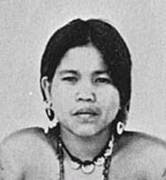 He put the coconut cup aside on the floor and came closer to her. He held her face between his hands and looked longingly at her beauty. But her eyes looked away. Never again would he hold her face. The next day she would not be his any more. She would go back to her parents. He let go of her face, and she bent to the floor again and looked at her fingers as they tugged softly at the split bamboo floor.
He put the coconut cup aside on the floor and came closer to her. He held her face between his hands and looked longingly at her beauty. But her eyes looked away. Never again would he hold her face. The next day she would not be his any more. She would go back to her parents. He let go of her face, and she bent to the floor again and looked at her fingers as they tugged softly at the split bamboo floor.
“This house is yours,” he said. “I built it for you. Make it your own, live in it as long as you wish. I will build another house for Madulimay.”
“I have no need for a house,” she said slowly. “I’ll go to my own house. My parents are old. They will need help in the planting of the beans, in the pounding of the rice.”
“I will give you the field that I dug out of the mountains during the first year of our marriage,” he said. “You know I did it for you. You helped me to make it for the two of us.”
“I have no use for any field,” she said.
He looked at her, then turned away, and became silent. They were silent for a time.
“Go back to the dance,” she said finally. “It is not right for you to be here. They will wonder where you are, and Madulimay will not feel good. Go back to the dance.”
“I would feel better if you could come, and dance—for the last time. The gangsas are playing.”
“You know that I cannot.”
“Lumnay,” he said tenderly. “Lumnay, if I did this it is because of my need for a child. You know that life is not worth living without a child. The man have mocked me behind my back. You know that.”
“I know it,” he said. “I will pray that Kabunyan will bless you and Madulimay.”
She bit her lips now, then shook her head wildly, and sobbed.
She thought of the seven harvests that had passed, the high hopes they had in the beginning of their new life, the day he took her away from her parents across the roaring river, on the other side of the mountain, the trip up the trail which they had to climb, the steep canyon which they had to cross. The waters boiled in her mind in forms of white and jade and roaring silver; the waters tolled and growled, resounded in thunderous echoes through the walls of the stiff cliffs; they were far away now from somewhere on the tops of the other ranges, and they had looked carefully at the buttresses of rocks they had to step on—a slip would have meant death.
They both drank of the water then rested on the other bank before they made the final climb to the other side of the mountain.
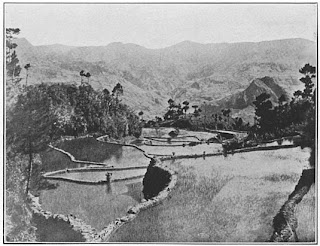 She looked at his face with the fire playing upon his features—hard and strong, and kind. He had a sense of lightness in his way of saying things which often made her and the village people laugh. How proud she had been of his humor. The muscles where taut and firm, bronze and compact in their hold upon his skull—how frank his bright eyes were. She looked at his body that carved out of the mountains five fields for her; his wide and supple torso heaved as if a slab of shining lumber were heaving; his arms and legs flowed down in fluent muscles–he was strong and for that she had lost him.
She looked at his face with the fire playing upon his features—hard and strong, and kind. He had a sense of lightness in his way of saying things which often made her and the village people laugh. How proud she had been of his humor. The muscles where taut and firm, bronze and compact in their hold upon his skull—how frank his bright eyes were. She looked at his body that carved out of the mountains five fields for her; his wide and supple torso heaved as if a slab of shining lumber were heaving; his arms and legs flowed down in fluent muscles–he was strong and for that she had lost him.
She flung herself upon his knees and clung to them. “Awiyao, Awiyao, my husband,” she cried. “I did everything to have a child,” she said passionately in a hoarse whisper. “Look at me,” she cried. “Look at my body. Then it was full of promise. It could dance; it could work fast in the fields; it could climb the mountains fast. Even now it is firm, full. But, Awiyao, I am useless. I must die.”
“It will not be right to die,” he said, gathering her in his arms. Her whole warm naked naked breast quivered against his own; she clung now to his neck, and her hand lay upon his right shoulder; her hair flowed down in cascades of gleaming darkness.
“I don’t care about the fields,” she said. “I don’t care about the house. I don’t care for anything but you. I’ll have no other man.”
“Then you’ll always be fruitless.”
“I’ll go back to my father, I’ll die.”
“Then you hate me,” he said. “If you die it means you hate me. You do not want me to have a child. You do not want my name to live on in our tribe.”
She was silent.
“If I do not try a second time,” he explained, “it means I’ll die. Nobody will get the fields I have carved out of the mountains; nobody will come after me.”
“If you fail–if you fail this second time–” she said thoughtfully. The voice was a shudder. “No–no, I don’t want you to fail.”
“If I fail,” he said, “I’ll come back to you. Then both of us will die together. Both of us will vanish from the life of our tribe.”
The gongs thundered through the walls of their house, sonorous and faraway.
“I’ll keep my beads,” she said. “Awiyao, let me keep my beads,” she half-whispered.
“You will keep the beads. They come from far-off times. My grandmother said they come from up North, from the slant-eyed people across the sea. You keep them, Lumnay. They are worth twenty fields.”
“I’ll keep them because they stand for the love you have for me,” she said. “I love you. I love you and have nothing to give.”
She took herself away from him, for a voice was calling out to him from outside. “Awiyao! Awiyao! O Awiyao! They are looking for you at the dance!”
“I am not in hurry.”
“The elders will scold you. You had better go.”
“Not until you tell me that it is all right with you.”
“It is all right with me.”
He clasped her hands. “I do this for the sake of the tribe,” he said.
“I know,” she said.
He went to the door.
“Awiyao!”
He stopped as if suddenly hit by a spear. In pain he turned to her. Her face was in agony. It pained him to leave. She had been wonderful to him. What was it that made a man wish for a child? What was it in life, in the work in the field, in the planting and harvest, in the silence of the night, in the communing with husband and wife, in the whole life of the tribe itself that made man wish for the laughter and speech of a child? Suppose he changed his mind? Why did the unwritten law demand, anyway, that a man, to be a man, must have a child to come after him? And if he was fruitless–but he loved Lumnay. It was like taking away of his life to leave her like this.
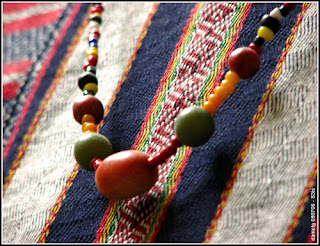 “Awiyao,” she said, and her eyes seemed to smile in the light. “The beads!” He turned back and walked to the farthest corner of their room, to the trunk where they kept their worldly possession—his battle-ax and his spear points, her betel nut box and her beads. He dug out from the darkness the beads which had been given to him by his grandmother to give to Lumnay on the beads on, and tied them in place. The white and jade and deep orange obsidians shone in the firelight. She suddenly clung to him, clung to his neck as if she would never let him go.
“Awiyao,” she said, and her eyes seemed to smile in the light. “The beads!” He turned back and walked to the farthest corner of their room, to the trunk where they kept their worldly possession—his battle-ax and his spear points, her betel nut box and her beads. He dug out from the darkness the beads which had been given to him by his grandmother to give to Lumnay on the beads on, and tied them in place. The white and jade and deep orange obsidians shone in the firelight. She suddenly clung to him, clung to his neck as if she would never let him go.
“Awiyao! Awiyao, it is hard!” She gasped, and she closed her eyes and huried her face in his neck.
The call for him from the outside repeated; her grip loosened, and he buried out into the night.
Lumnay sat for some time in the darkness. Then she went to the door and opened it. The moonlight struck her face; the moonlight spilled itself on the whole village.
She could hear the throbbing of the gangsas coming to her through the caverns of the other houses. She knew that all the houses were empty that the whole tribe was at the dance. Only she was absent. And yet was she not the best dancer of the village? Did she not have the most lightness and grace? Could she not, alone among all women, dance like a bird tripping for grains on the ground, beautifully timed to the beat of the gangsas? Did not the men praise her supple body, and the women envy the way she stretched her hands like the wings of the mountain eagle now and then as she danced? How long ago did she dance at her own wedding? Tonight, all the women who counted, who once danced in her honor, were dancing now in honor of another whose only claim was that perhaps she could give her husband a child.
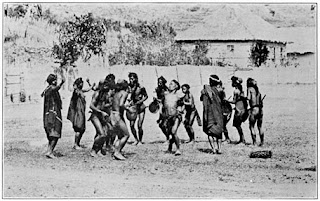 “It is not right. It is not right!” she cried. “How does she know? How can anybody know? It is not right,” she said.
“It is not right. It is not right!” she cried. “How does she know? How can anybody know? It is not right,” she said.
Suddenly she found courage. She would go to the dance. She would go to the chief of the village, to the elders, to tell them it was not right. Awiyao was hers; nobody could take him away from her. Let her be the first woman to complain, to denounce the unwritten rule that a man may take another woman. She would tell Awiyao to come back to her. He surely would relent. Was not their love as strong as the river?
She made for the other side of the village where the dancing was. There was a flaming glow over the whole place; a great bonfire was burning. The gangsas clamored more loudly now, and it seemed they were calling to her. She was near at last. She could see the dancers clearly now. The man leaped lightly with their gangsas as they circled the dancing women decked in feast garments and beads, tripping on the ground like graceful birds, following their men. Her heart warmed to the flaming call of the dance; strange heat in her blood welled up, and she started to run. But the gleaming brightness of the bonfire commanded her to stop. Did anybody see her approach?
She stopped. What if somebody had seen her coming? The flames of the bonfire leaped in countless sparks which spread and rose like yellow points and died out in the night. The blaze reached out to her like a spreading radiance. She did not have the courage to break into the wedding feast.
Lumnay walked away from the dancing ground, away from the village. She thought of the new clearing of beans which Awiyao and she had started to make only four moons before. She followed the trail above the village.
When she came to the mountain stream she crossed it carefully. Nobody held her hand, and the stream water was very cold. The trail went up again, and she was in the moonlight shadows among the trees and shrubs. Slowly she climbed the mountain.
When Lumnay reached the clearing, she cold see from where she stood the blazing bonfire at the edge of the village, where the wedding was. She could hear the far-off clamor of the gongs, still rich in their sonorousness, echoing from mountain to mountain. The sound did not mock her; they seemed to call far to her, to speak to her in the language of unspeaking love. She felt the pull of their gratitude for her sacrifice. Her heartbeat began to sound to her like many gangsas.
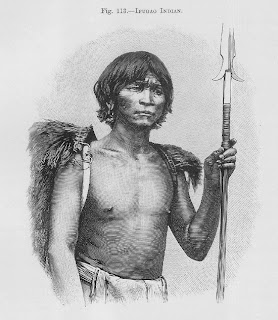 Lumnay thought of Awiyao as the Awiyao she had known long ago– a strong, muscular boy carrying his heavy loads of fuel logs down the mountains to his home. She had met him one day as she was on her way to fill her clay jars with water. He had stopped at the spring to drink and rest; and she had made him drink the cool mountain water from her coconut shell. After that it did not take him long to decide to throw his spear on the stairs of her father’s house in token on his desire to marry her.
Lumnay thought of Awiyao as the Awiyao she had known long ago– a strong, muscular boy carrying his heavy loads of fuel logs down the mountains to his home. She had met him one day as she was on her way to fill her clay jars with water. He had stopped at the spring to drink and rest; and she had made him drink the cool mountain water from her coconut shell. After that it did not take him long to decide to throw his spear on the stairs of her father’s house in token on his desire to marry her.
The mountain clearing was cold in the freezing moonlight. The wind began to stir the leaves of the bean plants. Lumnay looked for a big rock on which to sit down. The bean plants now surrounded her, and she was lost among them.
A few more weeks, a few more months, a few more harvests—what did it matter? She would be holding the bean flowers, soft in the texture, silken almost, but moist where the dew got into them, silver to look at, silver on the light blue, blooming whiteness, when the morning comes. The stretching of the bean pods full length from the hearts of the wilting petals would go on.
Lumnay’s fingers moved a long, long time among the growing bean pods.
SOURCE: Seasite; NCCA. PHOTO CREDIT: Merriam.org (for the rice terraces painting); Daniel Y. Go (for the Igorot beads); Gutenberg.org (for all the others).
When you studied at SLU, this was the first subject story they require you to read in Philippine Literature. Don’t know with other instructors
Hi Nats,
It was also a required reading for us in the college I attended. Pero honestly I didn’t understand the story at that time. Pero ngayon naintindihan ko na. Thanks.
Bill, I really should not stop believing in God. He heard my prayers.
During the last week of May, I was in writeshop with Dr. June Prill-Brett and other resource people on culture. We talked about divorce under customary laws. I shared the Wedding Dance to them but I could not get my facts straight. I read it years ago. From then on, it haunted me. I promised Dr. Prill-Brett and the others that I would look for a copy and send each of them. And here is the answer! I did not have to work very hard at finding a copy.
Thanks.
In my blog, I also said we should discuss divorce uncder customary law sometime
Thanks.
Hi Chyt,
Interestingly, I wanted to blog about The God Stealer ni F. Sionil Jose (one of my favorite authors) pero hindi ko mahanap. Eh ito ang nakita ko. God must really work in mysterious ways ano?
Divorce under customary law would be a very interesting discussion. Looking forward to it in SRT. Thanks.
I’ve always loved this story. First read it in High School. I did a reaction paper on it and it boosted my failing grade, that’s why I love it! Hehehe, No! Honestly, ‘love it! It made me trublue.. if you know what i mean.. 🙂
Hi Ferri,
Aha, hopefully you still have that reaction paper so you’ll put it in your blog. As I’ve mentioned to Nats above, hindi ko na-gets ang story when I read it in college. I guess it must take a feminine sensitivity to easily grasp what the story is about (Or maybe I resisted undertanding it because it was an assignment. Minsan kasi works of literature should not be assigned kasi our natural response to assignments is to resist them hehe.) Although when I read it again, I realized that it is a very sad story. Thanks.
hello!
is this the whole “The Wedding Dance”??coz we are required to read it.. 🙂
ei, don’t you have the copy of the summary of this? i find it hard to summarize this.. it’s a very long story.. uhmm, i need the summary of this as a reported speech not in a quoted one.. so, it’s a li’l hard.. if you can help me, kindly e-mail me at nikkilorenlibunao@yahoo.com. thanks alot!
what would lumnay be waiting for?
i love raeding this kind of story!!!!!!!!!!!
WHERE DID THIS STORY HAPPENED?
/im a full blooded igorot and i love the story yet it had leaved lots of question in my mind what was
really the ending of the story…
Where the story happen ??
it was a very nice story
the wedding dance.
so very………………………
searcher po ako ng inyong site
is ds d whOle stOry Of d wEdding dance? causE arE ”ENGLISH” teachEr requirEd us 2 hav d cOpy Of it…….. and 2 rid it.becaUse it is part Of Our new curiculOm…”HEHEHE!..
very good idea,,,NICE TLAGA KASI SO LONG
thnx 4 the copy ..i realy need this ..its the first story that our teacher required us 2 read on the 2nd week of class for freshman high school students in our school …thnx again!!
can you explain the ending of the story?
wla pa bang mas taas pa nyn chaar!!! na kakakakaaka bbooorriiing naman????????????????????????????????????????????????????????????????????????????
ang gnda ng story
ahahaha…,,,hAbA namAn
what is the fable of the story of the wedding dance
HEY GUYS,,, CAN YOU HELP ME…I NEED A COMICSTRIP OF THE WEDDING DANCE BY AMADOR DAGUIO
haba nmn ni2 kla koh bah short story ahex!
the story was great ! at first i don’t really understand what the story all about but when i read it for the second time i fully understand what this story talked about. But at the end its really confusing.
hnep astig to the highest level
taasa pud kaayo uy
ang haaaaba
:}
maganda,,
who is to blame in the story the wedding dance? is that the women ,man or child?
nakakaiyak naman yang short storry nayan,sana may part 2 pa
ano ng nangyari kay lumnay?
what happen to lumnay? why lumnay didnt have a child? i dont understand the story……?????
i love the story so well…..i understand all………………………………………………………………………………………………………………………………………………….and i am crying because i related it
………………………………….
hi poh sa lhat ang ganda ng story
i am very!! thank full bcauz i acedentally read diz story it is very interesting
i luv it
it’s so very beatiful.
This is the first time I read the story and it affected me so much that I cried. My deep respect goes to Amador Daguio for rising through challenges and for this one. Thank you.
hmm..nbasa q na.. mkkapasa nq nito sa exam… hehe
This was the first story our Philippines literature instructor asked us to read. At first, I just read it as another story of an ill-fated love. The class spent some time analyzing the message of the story. Soon, we came to understand that what Mr. Daguio’s piece wanted to tell us is the customary law on marriage of an indigenous group/s here in the Cordillera.
After seven years (please correct me if I’m wrong) of union and the wife can not bear a child, the couple will separate. The man will marry another woman. According to old folks and as reflected in the story, if no child or children is/are born to the couple, the gods do not approve of their union.
As the story ended without a clear picture, our class believed that Lumnay lived with her parents and died lonesome but still loving Awiyao.
..he he ganda ng story!!!!nakakabitin nga eh…sana sa panahon ngagon wala na!! :c
ahm…according to our instructor in Philippine Literature it’s only 3 and a half years…
describe and explain the them of the story?
what is the theme?
fyi, lumnay got pregnant actually. see, thy planted seeds four months ago, she and awiyao, then when she came back on the later part of the story, alone and crying, the beans have grow and there are flowers and it is moisture. the flower symbolizes Lumnay and the moisture as her tears. later, it had fruits. it’s all about symbolism people, don’t claim you understood it when really you didn’t. she got pregnant.
nice story..very interesting. i love it. subra bonga2x u know..sa hindi pa nakabasa, i invited you all to read and learn kung ano ba talaga laman ng story na ito….
“go out and dance”.. sabi nga sa story. very glamorous story,…..
i really wanted to know what happened to Lumnay….
and if there’s a part 2 I’d i love to read it….
How wonderful.., this is what you call true love.., because love is not a selfish thing.., and if u love someone you shud set him/her free if he/she is not happy or doesn’t want u anymore.., true love waits as well as understands <3 very gud story and i guess ang pagkabitin ng story is also good bcoz it will really mark us, coz we'll keep on thinking if what really happened next….
Woman, if you are slapped by your man, it’s time to bail out. And man, don’t beat up on women; that’s cowardice. And man, stop being jealous; there’s a lot of women out there, just look around.
wow……its fantastic…………a story very glamorous
What does the sound of the gangs as represent in the story? In what way does it become an effective symbol?
The God Stealer by F. Sionil Jose could be seen in the UST textbook: “Philippine Literatures: Texts, Themes, Approaches” by Wigley, et al
the story was great! it is not right that when you marry a woman and having no child with her, you’ll just leave her and get another woman and when the same thing happen again you’ll leave her again. lumnay really loved awiyao for she could not leave her and to not marry again and still hope for awiyao to come back to her.
This is a one of a kind story !!!
I LOVE IT……..
ang ganda ganda….
TRY MO???
awesome!
Amador Daguio is great!
i love the story…it touches my heart…
aha.
is there another short story by amador daguio?
this story is a nice one …wow !!kalinga people are also a very good writer
this is required in our subject..literature.
well it touched me..seems im need to cry huhuhu…..i’m proud to be here in kaling!!!
kapit bahay ng teacher ka yan!!!si mr.Daguio
nice story,….if you will ask to chose between love and law…which one would you pick?hehehe……
its so touching … love…. so ironic hai…
speechless 🙁
i guess if i’m on the shoes of Lumnay i will do the same thing :'(
superb!!!! now i know,, hehehe
i really like the story its very meaningful to me…..
the story was so sad, honestly i hate it…
this is my first story that i read in philippine literature
the story bits so nice and powerful.
what do you think,? why is it entitled th wedding dance?
is in’t the guy is selfish? he only thinks of his welfare?
i love the story..im always teary eyed everytime im reading it…
I feel pity with the situation of lumnay now…………But I learn that love is useless if it is no proper wedding………the love of awiyao is not constant thats why he left lumnay……If his love is true he can’t do that even what happen……:)
the situation of lumnay is very sad because she can’t give a child to awiyao so awiyao find another woman to marry to give him a child..its unfair to lumnay..for that rison only if awiyao love lumnay this should not be done for her..
That’s why our home country is in dire despicable state coz of love stories like this. After you’ve read the book, get over it and move on….let Awiyao and Lumnay rest in peace, hehe….
Separation was the norm among Kalinga tribes before Christian missionaries came. As portrayed in Amador Daguio’s short story, separation happened as a result of peer pressure. I don’t know about others but among the iVanao, the tribe where I belong, childless couples were also forcibly separated by the elders who wanted them to find their respective matches.
Childless couples were somewhat considered a liability because they did not produce children who would one day become warriors or food producers. In short, divorce during those times were more of a necessity rather than a result of incompatibility.
I also found the ending of “The Wedding Dance” confusing when I was in college but obviously he let it end that way because at the time he wrote it, the practice of separation was still widespread in some places; the teachings of the Church have not yet taken hold. It was his way of challenging a practice he did not like. Or maybe at that time, some people were already discussing the possibility of putting the practice to an end.
Very impassionate story i like it..Im so touch.our prof. in Philippine literature required us a research paper of wedding dance…..
I really like the story.
At first I don’t know why it was entitled Wedding Dance, but now I really understood.
maganda talaga.!
Sana malagay dn ito sa libro nmin sa LIitt.
amm its okay but its is very sad for the girl had never a child !!! :((
love it
awesome couz i am also from the land of beautiful kalinga..nice having this story..
i love the story!!but a feel pity with the situation of lumnay,,bcUz she relly loves shes X husbie ^_^ but the story was so nce!!!
Very thought-provoking! My students love it, too! I strongly recommend it! I love the author!
it was also a reading requirement for us, the English majors, here in Central Luzon State University for literary subjects such as Intro to Lit, Phil. Lit. among others. 🙂
-fave of our teachers…. 🙂
i’m writing a critical essay for this story using formalistic approach for our subject Literary Criticism.
😉
love it hahaha well its true that is short story 🙂 😉 😀 😛
HELP ME NMAN I NEED TO FIND OUT THE IMPORTANT PERSON,PLACE AND etc
it is very very very long story!!!!
🙂 i Like it…… I will print this…cause this is my project